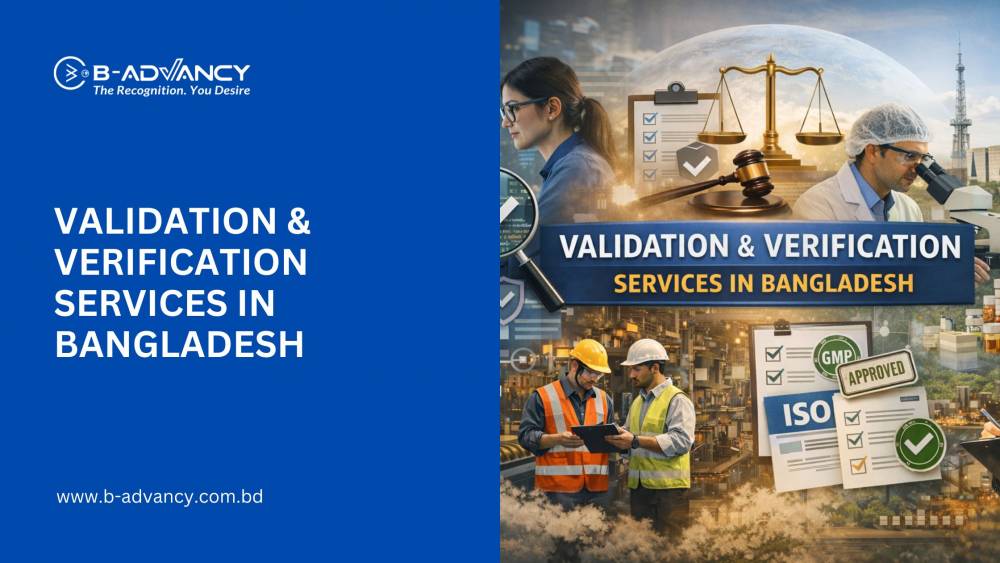The packaging industry in Bangladesh is witnessing significant growth, driven by the increasing demand for high-quality packaging solutions in various sectors such as food and beverage, pharmaceuticals, and consumer goods. To stay competitive in this evolving market, companies in the packaging industry must adhere to international standards that ensure quality, safety, and sustainability. ISO certification plays a crucial role in helping packaging companies meet these standards. This blog will explore the importance of ISO certification for the packaging industry in Bangladesh, the benefits it offers, relevant rules and regulations, and how you can start your certification journey with B-ADVANCY Certification Limited.
What is ISO Certification and Why is it Important for the Packaging Industry?
ISO certification refers to the certification of a company’s management systems, processes, and products in accordance with internationally recognized ISO standards. In the packaging industry, ISO standards cover various aspects, including quality management (ISO 9001), environmental management (ISO 14001), and food safety management (ISO 22000), among others.
In Bangladesh, the packaging industry plays a vital role in supporting other key industries, such as food processing, pharmaceuticals, and consumer goods. However, the industry faces challenges related to quality control, environmental impact, and compliance with international regulations. Implementing ISO standards helps packaging companies address these challenges by promoting consistency, improving product quality, and reducing environmental footprints.
Key ISO Standards Relevant to the Packaging Industry
-
ISO 9001: Quality Management Systems
-
ISO 9001 is the most widely recognized standard for quality management systems. It provides a framework for companies to ensure that their products consistently meet customer requirements and regulatory standards.
-
ISO 14001: Environmental Management Systems
-
ISO 14001 focuses on minimizing environmental impact. It helps packaging companies implement environmentally responsible practices, such as waste reduction, resource conservation, and pollution prevention.
-
ISO 22000: Food Safety Management Systems
-
For packaging companies involved in the food industry, ISO 22000 is crucial. It ensures that the packaging materials used are safe and free from contaminants, thereby protecting consumer health.
-
ISO 45001: Occupational Health and Safety Management Systems
-
ISO 45001 focuses on ensuring a safe and healthy workplace. It is particularly important in the packaging industry, where workers may be exposed to hazardous materials and processes.
-
ISO 50001: Energy Management Systems
-
ISO 50001 provides a framework for energy management, helping packaging companies reduce energy consumption and improve energy efficiency, which can lead to cost savings and environmental benefits.
Benefits of ISO Certification for the Packaging Industry in Bangladesh
-
Enhanced Product Quality and Consistency
-
ISO certification ensures that packaging products meet high standards of quality and consistency, which is critical for maintaining customer satisfaction and loyalty.
-
Improved Environmental Performance
-
Implementing ISO 14001 helps packaging companies reduce their environmental impact, which is increasingly important in a market where consumers and regulators are prioritizing sustainability.
-
Increased Market Access
-
ISO certification is often a prerequisite for entering international markets. By obtaining ISO certification, packaging companies in Bangladesh can expand their market reach and compete globally.
-
Better Risk Management
-
ISO standards provide a structured approach to risk management, helping companies identify and mitigate potential risks related to product quality, safety, and environmental impact.
-
Compliance with Regulatory Requirements
-
ISO certification ensures that packaging companies comply with national and international regulations, reducing the risk of legal issues and penalties.
Bangladesh Rules and Regulations Regarding ISO Certification
In Bangladesh, the government emphasizes the importance of adhering to international standards like ISO to ensure the quality and safety of products across various industries, including packaging. The Bangladesh Standards and Testing Institution (BSTI) is the national body responsible for the development and enforcement of standards in the country. BSTI ensures that companies comply with relevant ISO standards, thereby promoting quality and safety in the packaging industry.
Additionally, the Department of Environment (DoE) in Bangladesh regulates the environmental impact of industrial activities, including those in the packaging sector. Companies must comply with environmental regulations to minimize their impact on the environment, and ISO 14001 certification can help achieve this compliance.
For more information, you can visit the official websites of:
Steps to Achieve ISO Certification for Your Packaging Business
-
Initial Assessment and Gap Analysis
-
Begin by assessing your current processes and systems against the relevant ISO standards. Identify any gaps and areas for improvement to align with the standards.
-
Develop and Implement Management Systems
-
Implement the necessary management systems, such as quality, environmental, or food safety management systems, depending on the ISO standard you are pursuing.
-
Internal Audit and Management Review
-
Conduct internal audits to ensure that your management systems are effective and meet the requirements of the ISO standards. Regularly review the systems with top management to address any issues.
-
Select a Certification Body
-
Choose a reputable certification body, like B-ADVANCY Certification Limited, to conduct an external audit. Prepare thoroughly for the audit to demonstrate compliance with the ISO standards.
-
Achieve Certification and Continuous Improvement
-
After a successful audit, you will receive ISO certification. It’s important to continuously monitor and improve your management systems to retain certification and realize ongoing benefits.
Challenges in Implementing ISO Certification
While ISO certification offers numerous benefits, packaging companies may face challenges during implementation, such as:
-
Resource Allocation
-
Implementing ISO standards requires investment in training, technology, and system development. Companies must allocate sufficient resources to achieve and maintain certification.
-
Change Management
-
Transitioning to new management systems can be challenging, particularly if employees are resistant to change. Effective training and clear communication are key to overcoming this resistance.
-
Complexity of Compliance
-
Compliance with multiple ISO standards can be complex, especially for companies that operate in highly regulated industries like food and pharmaceuticals. A well-structured approach is essential for successful certification.
B-ADVANCY Certification Limited can provide expert guidance and support to help you navigate these challenges and achieve ISO certification smoothly and efficiently. To contact them: Email: bangladesh@b-advancy.com | Call: +8801612264559
Conclusion
ISO certification is a strategic investment for the packaging industry in Bangladesh. It enhances product quality, environmental performance, and market access, while also ensuring compliance with national and international regulations. By aligning your packaging processes with ISO standards, you can achieve better business outcomes, reduce risks, and gain a competitive edge in the market. Despite the challenges, the long-term benefits of ISO certification make it a worthwhile endeavor for any packaging company aiming for excellence and sustainability.


34.jpg)



































































































































































































